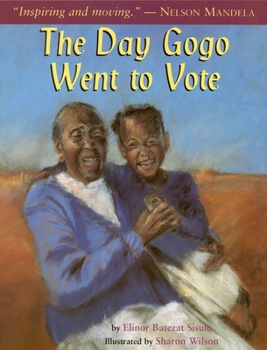The Day Gogo Went to Vote
Select Format
Select Condition 
Book Overview
Illustrated in rich pastels, this child's-eye view of an important milestone in South African history allows young readers to experience every detail of this eventful day.
Format:Paperback
Language:English
ISBN:0316702714
ISBN13:9780316702713
Release Date:September 1999
Publisher:Little, Brown Books for Young Readers
Length:32 Pages
Weight:0.40 lbs.
Dimensions:0.2" x 8.6" x 11.0"
Age Range:4 to 8 years
Grade Range:Preschool to Grade 3
Customer Reviews
3 ratings
Superb Childrens book about a small part of South Africa
Published by Thriftbooks.com User , 25 years ago
I ordered this book knowing my six year old daughter would love it. Having lived in South Africa for 20 years and now living in Australia, a black person voting in South Africa meant a great thing to our elders. I wanted to share a bit of joy with my daughter and she enjoyed the book. It is a spiritiual book for both young and old to relish.
Gogo, a great-grandmother, votes in S. Africa's election.
Published by Thriftbooks.com User , 26 years ago
Thembi's great-grandmother, Gogo decides that the 1994 election allowing black South Africans voting rights is too important to miss. Gogo is the township's oldest resident and Thembi is one of the youngest. With help from a wealthy neighbor, Gogo is able to go to the polling place to cast her vote, accompanied by Thembi and her parents. The Day Gogo Went to Vote is the winner of the Simon Wiesenthal Center Children's Book Award and clearly displays the themes of equality of people, dignity, and social justice. The excellent illustrations portray the beautiful relationship between Thembi and Gogo as well as the impact this 1994 election had on black South African's.
A welcome addition to children's books about S. Africa.
Published by Thriftbooks.com User , 26 years ago
The sub-title of this new children's picture book says it all. Everybody in South Africa remembers those astonishing days when the unbelievable happened and all South Africans went to vote. Today, when you go to a former township or homeland and ask anybody, "How was it when you voted?" you'll get a wonderful story about getting up early, walking a long, long way and then waiting, waiting, waiting. Outsiders are amazed at the patience and dignity of the often vast crowds waiting at polling stations in places like Soweto. But the people who sat or stood for most of the day with blankets and food, with their children or old parents, will tell you they could have waited peacefully for much longer. After all, they'd already waited all their lives! In The Day Gogo Went to Vote, this momentous time is seen through the eyes of little Thembi whose hundred-year-old great-grandmother, "Gogo", takes care of her every day while her parents are at work. Thembi's questions are answered in a way that explains election procedures to young readers but for Thembi the real impact of voting day was that Gogo was going out! Gogo had never "left the yard', even to go to church, since the long ago day when she had been humiliated and shouted at by a man at the pensions office. When the day comes, Thembi experiences one extraordinary event after another. Wearing their best clothes, she and Gogo ride in a rich store-owner's "Benz", a machine makes Gogo's hands look blue, press cameras flash, her parents cry and no-one remembers to send her to bed that night when friends and family feast and toyi-toyi through the night. Elinor Batezat Sisulu, a social worker in Cape Town, worked at a polling booth in April, 1994. Her book is a welcome addition to small but growing number of books about South African children. Bio of reviewer: Pam Sacks is owner of the Cheshire Cat book store for children in Washington, D.C. and reviewed the book in June 1996 for JULUKA Newsletter (301) 652-5754.






